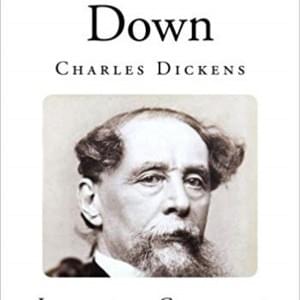
Hunted Down (Chap. 2) Charles Dickens
На этой странице вы найдете полный текст песни "Hunted Down (Chap. 2)" от Charles Dickens. Lyrxo предлагает вам самый полный и точный текст этой композиции без лишних отвлекающих факторов. Узнайте все куплеты и припев, чтобы лучше понять любимую песню и насладиться ею в полной мере. Идеально для фанатов и всех, кто ценит качественную музыку.

The partition which separated my own office from our general outer office in the City was of thick plate-glass. I could see through it what passed in the outer office, without hearing a word. I had it put up in place of a wall that had been there for years,—ever since the house was built. It is no matter whether I did or did not make the change in order that I might derive my first impression of strangers, who came to us on business, from their faces alone, without being influenced by anything they said. Enough to mention that I turned my glass partition to that account, and that a Life Assurance Office is at all times exposed to be practised upon by the most crafty and cruel of the human race.
It was through my glass partition that I first saw the gentleman whose story I am going to tell.
He had come in without my observing it, and had put his hat and umbrella on the broad counter, and was bending over it to take some papers from one of the clerks. He was about forty or so, dark, exceedingly well dressed in black,—being in mourning,—and the hand he extended with a polite air, had a particularly well-fitting black-kid glove upon it. His hair, which was elaborately brushed and oiled, was parted straight up the middle; and he presented this parting to the clerk, exactly (to my thinking) as if he had said, in so many words: ‘You must take me, if you please, my friend, just as I show myself. Come straight up here, follow the gravel path, keep off the grass, I allow no trespassing.’
I conceived a very great aversion to that man the moment I thus saw him.
He had asked for some of our printed forms, and the clerk was giving them to him and explaining them. An obliged and agreeable smile was on his face, and his eyes met those of the clerk with a sprightly look. (I have known a vast quantity of nonsense talked about bad men not looking you in the face. Don’t trust that conventional idea. Dishonesty will stare honesty out of countenance, any day in the week, if there is anything to be got by it.)
I saw, in the corner of his eyelash, that he became aware of my looking at him. Immediately he turned the parting in his hair toward the glass partition, as if he said to me with a sweet smile, ‘Straight up here, if you please. Off the grass!’
In a few moments he had put on his hat and taken up his umbrella, and was gone.
I beckoned the clerk into my room, and asked, ‘Who was that?’
He had the gentleman’s card in his hand. ‘Mr. Julius Slinkton, Middle Temple.’
‘A barrister, Mr. Adams?’
‘I think not, sir.’
‘I should have thought him a clergyman, but for his having no Reverend here,’ said I.
‘Probably, from his appearance,’ Mr. Adams replied, ‘he is reading for orders.’
I should mention that he wore a dainty white cravat, and dainty linen altogether.
It was through my glass partition that I first saw the gentleman whose story I am going to tell.
He had come in without my observing it, and had put his hat and umbrella on the broad counter, and was bending over it to take some papers from one of the clerks. He was about forty or so, dark, exceedingly well dressed in black,—being in mourning,—and the hand he extended with a polite air, had a particularly well-fitting black-kid glove upon it. His hair, which was elaborately brushed and oiled, was parted straight up the middle; and he presented this parting to the clerk, exactly (to my thinking) as if he had said, in so many words: ‘You must take me, if you please, my friend, just as I show myself. Come straight up here, follow the gravel path, keep off the grass, I allow no trespassing.’
I conceived a very great aversion to that man the moment I thus saw him.
He had asked for some of our printed forms, and the clerk was giving them to him and explaining them. An obliged and agreeable smile was on his face, and his eyes met those of the clerk with a sprightly look. (I have known a vast quantity of nonsense talked about bad men not looking you in the face. Don’t trust that conventional idea. Dishonesty will stare honesty out of countenance, any day in the week, if there is anything to be got by it.)
I saw, in the corner of his eyelash, that he became aware of my looking at him. Immediately he turned the parting in his hair toward the glass partition, as if he said to me with a sweet smile, ‘Straight up here, if you please. Off the grass!’
In a few moments he had put on his hat and taken up his umbrella, and was gone.
I beckoned the clerk into my room, and asked, ‘Who was that?’
He had the gentleman’s card in his hand. ‘Mr. Julius Slinkton, Middle Temple.’
‘A barrister, Mr. Adams?’
‘I think not, sir.’
‘I should have thought him a clergyman, but for his having no Reverend here,’ said I.
‘Probably, from his appearance,’ Mr. Adams replied, ‘he is reading for orders.’
I should mention that he wore a dainty white cravat, and dainty linen altogether.
Комментарии (0)
Минимальная длина комментария — 50 символов.












